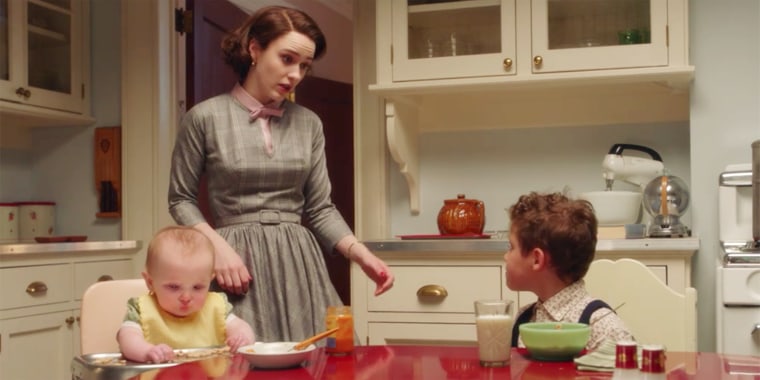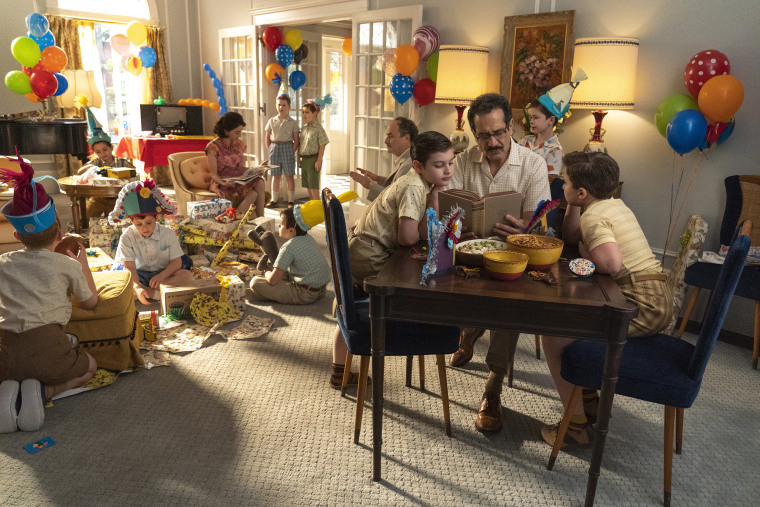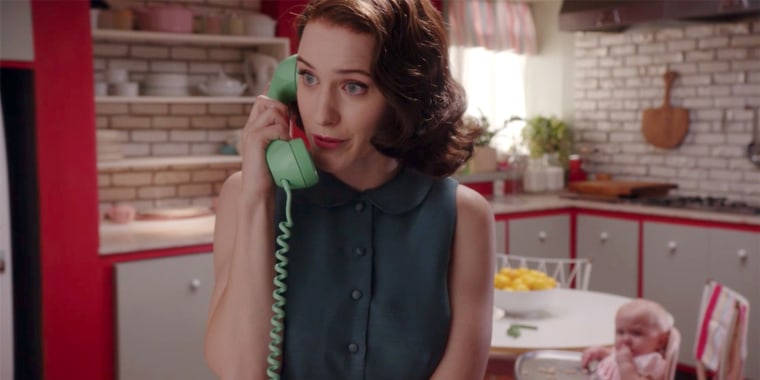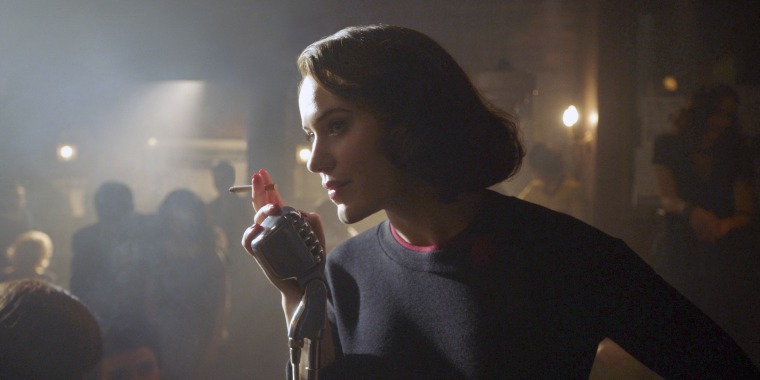Season 4 of Amazon's award-winning show "The Marvelous Mrs. Maisel" premieres on Feb. 18, and as viewers watch Midge Maisel's latest adventures, one often-regurgitated piece of commentary is sure to surface. Again.
Where are Mrs. Maisel's children?
I have to ask: Why do you need to know?
In the show, affluent 1950's housewife Miriam “Midge” Maisel (Rachel Brosnahan) leaves her cheating husband, Joel Maisel (Michael Zegen), focusing less on their two children and more on a career in stand-up comedy. In 2019, Brosnahan told "The Hollywood Reporter" that the scarce screen time in which Midge is seen actively caring for her children is often attacked as “lazy writing” or a major “plot hole.”
“It’s been eye-opening and frustrating that that has been one of the primary criticisms of this character and of the show,” Brosnahan said in 2019.
The criticism has continued, making it more clear that society still requires "proof" that working moms can also be loving caregivers, while working dads — real or not — are simply afforded that assumption.

Viewers certainly didn't need to watch Don Draper (Jon Hamm) interact with his children on every single episode of "Mad Men" to assume he was a loving father — even when all evidence pointed otherwise. He was a driven businessman, flawed in his drinking and womanizing, sure, but always a devoted, apologetic father.
Nor did those in the 90s and early 2000s demand to see Ross Geller (David Schwimmer) interacting with his son from his first marriage to surmise he was the affectionate, caring dad of the "Friends" characters. It wasn't until he had a child with Rachel Green (Jennifer Aniston) that we saw Geller parent on a more consistent basis — and that was only because he was parenting alongside Green.
Rachel was the primary caregiver — a working mom who needed to show the world she was still parenting — leaving Geller free to play with his dinosaur bones.
Related: ‘Mrs. Maisel’ creator gushes over Milo Ventimiglia in latest season
Fans did not see Ron Swanson (Nick Offerman) parent on every episode of "Parks and Recreation" after he became a stepfather and welcomed his own son into the world, either. Swanson has been hailed as one of the best on-screen dads in television history.
So has Walter White (Bryan Cranston), who ends up destroying his own family through his illegal dealings on "Breaking Bad." Yet even the pain he causes is washed away by his "good intentions" and a desire to provide for his family after his death.
All of these fictional working fathers were afforded the leeway that comes with men being innately viewed as multifaceted, multi-dimensional human beings with needs and desires outside of parenthood.
But in a television show about comedy, not motherhood, viewers are still told to ponder how a mom pursuing stand-up comedy could really care for her offspring, if we don't see it — consistently — for ourselves.

Alex Borstein, who plays Susie, Midge’s manager, said it best when she compared Midge to her own life in 2019.
“I leave my children to come shoot on this show, and it doesn’t mean I am a s----- mother. It doesn’t mean I’m neglectful,” she said. “It’s about choice, and women have a myriad of choices to work, to not work, to raise children, to not raise children, to be in a heterosexual relationship, to be in a homosexual relationship, whatever.”
Midge provides more than just a fictional "inside look" at how an affluent white mom in the 1950s may parent her child — with hired help and mid-day drop offs at her parent's sprawling apartment. That aspect of her life is not why people watch the show — they watch to see how Midge can navigate her career aspirations and romantic relationships and a friendship with her unapologetic manager.
Related: ‘The Marvelous Mrs. Maisel’ star Rachel Brosnahan enters darker era in ‘I’m Your Woman’
We do not see what or how Midge is able to provide for her kids, but given her affluence and privilege it can be assumed that she is leaving them in loving, capable hands.
“We know now with the perspective of a modern time that a fulfilled woman and a woman who has ambition and talent is going to end up being the greatest kind of mother,” Caroline Aaron, who plays Joel’s mother, told "The Hollywood Reporter." “She’s not ditching, she’s just trying to figure out a way to put both of her ambitions together.”
The comings and goings of parenthood would, arguably, be the most boring aspects of Midge's life — as they often are for caregivers. The mundane diaper changes; the twilight bottle-feeds; the thousands of temper tantrums; the truncated nap schedules. The monotony of motherhood can certainly be comical, and has been fictionalized in television shows for decades. But it is not the point of "The Marvelous Mrs. Maisel."

What "Maisel" provides, instead, is a look at the life of a working mom that doesn't rely on the presence of her children for comedy or narrative drama. It's a revolutionary act, even now, when working moms still handle the majority of the childcare and household responsibilities and when we often see their children in the background of another Zoom meeting or hear them screaming during a conference call.
With Midge, we're reminded that moms are individual people outside of and away from our children, with lives that are just as interesting, just as comical, and just as valuable as the lives we share with our children.
Related: Rachel Brosnahan has ‘no idea’ what’s in store for season 4 of ‘Marvelous Mrs. Maisel’
So, if we don't assume Midge is ailing from a horrific bout of constipation when we don't watch her go to the bathroom every episode...
If we don't presume she suffers from insomnia when we don't see her perform her evening beauty routine and fall asleep every night...
If we don't pretend to know how many cavities Midge may have when we don't see her brushing her teeth every morning and evening...
If we don't accuse Midge of wearing dirty underwear because we don't see her doing the laundry...
Then let us please — at a time when mothers are burnt out and in dire need of a reminder that they do exist outside of the confines of motherhood — enjoy "The Marvelous Mrs. Maisel" for what it is: A show about a privileged woman who decided to define herself as someone other than a mom. She's a lover. A comic. A businesswoman. Flawed. Ambitious. Fed-up.
A person.
Related:

